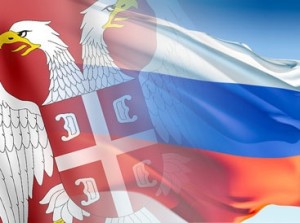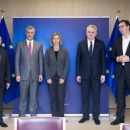Balkan region in general and Serbia in particular have always been an issue about which Russians demonstrate constant concern and high level of involvement. It hardly comes out of current geopolitical situation only, even considering all global trends and general tension upon a number of questions that now are treated as international ones. Today it seems to be beyond a good form to operate concepts of a historical ally or on the contrary – a rival, traditional support or confrontation, and so on – all that used to be very common and organic before, not so far in the past. Deliberately unclaimed and mistreated categories are still a significant part of modern geopolitical reality, no matter if they are paid close attention or completely ignored in geopolitical rhetoric.

Elena S. Arlyapova: Manifesto by Nikolai II from 1914 July 20 offered short, but clear to all and every Russian and overall shared motivation of Russian entry into the war for Serbia: “following our historical vows”.
Forthcoming Anniversary of the beginning of the World War I next year gives a good chance to remember what have laid in the base of Russian-Serbian relationship for years of time. Famous Manifesto by Nikolai II from 1914 July 20 offered short, but clear to all and every Russian and overall shared motivation of Russian entry into the war for Serbia: “following our historical vows”[1]. Today we talk less about our unity of the faith, mutual sympathies and understanding, and more about pragmatic cooperation and mutual benefits. It does not seem to be a right source to bring up reliable long-run relationship like the one Russia and Serbia still have.
Skeptics may say it is all about Serbian geographical location, which leads to its customary role as Russian “outpost” in the Balkan region and moreover – in Europe. It is true, but it is only a part of a game. When pointing out Serbian geopolitical status and potential role for Russia, someone should not skip the reverse of the medal: Serbia serves as “outpost” for Russia as well as Russia serves as “outpost” for Serbia – within the region and moreover – Europe, Eurasia and the World. So, time-proved unity works to momentary good too.
There was not craftiness or play in Vladimir Putin’s words said in Narodnaya Skupschina in March 2011 during his official visit to Serbia and been admitting the fact of absence within Russian party spectrum of any political force indifferent or opposing to traditional friendship and further development of relationship between Russia and Serbia. It is truly “absolute public consensus”[2] in Russia.
There was not craftiness or play in Vladimir Putin’s words said in Narodnaya Skupschina in March 2011 during his official visit to Serbia and been admitting the fact of absence within Russian party spectrum of any political force indifferent or opposing to traditional friendship and further development of relationship between Russia and Serbia. It is truly “absolute public consensus”[2] in Russia. Even in 1990s, when vast majority of Russians lost their interest to country foreign policy against a background of tremendous social and economic transformations, which took a real effort from people to survive and adapt somehow to new reality, uncharted waters for all and every “born in USSR”, involvement in Serbian problematic held out. Opinion poll in the second half of 1998 displayed high familiarity of Russians on geography and chronic of the conflict: only 14% did not show any interest to this, at the same time sympathy of 22% of well-informed responders were found on the side of Serbs (to compare: 5% – for Albanians). More than a half interrogated Russians for that time demonstrated lack of sympathy neither of the sides – 59%. However, escalation of the conflict changed situation with public opinion dramatically. Dynamics went as following: NATO bombing of Yugoslavia did not “cause any special feelings” of 4% only, 1% approved the action, 2% pointed “understanding”, 59% and 28% stated their indignation and deep concern accordingly[3].
Posterior polls demonstrated strength of derived indexes, including data upon sentiments of the Russians towards Serbs. Even widely cited public opinion poll upon sovereignty of Kosovo in September, 2008 (experts unanimously called it the direct sequent of recent recognition by Russian Federation the independence of Abkhazia and Yuzhnaya Ossetia) did not become an exception. Then, during the time run from March to September the number of interrogated Russians ready to support separation and recognition of Kosovo grew from 15% up to 31%. However, dominate tendency of “greater sympathy with Serbs” remained the same. Also, it should be mentioned that the number of opponents of such separation and recognition reduced just slightly – from 41% down to 38%[4]. On the 10th anniversary of bombing Belgrade only 16% of citizens considered that Russia shouldn’t get involved in Yugoslavian crisis, while overwhelming majority had great confidence that Russia had to come out as mediator in negotiations and to strive for peaceful settlement of Kosovo issue. Just a little bit behind were indexes, presented the variation of full-scale humanitarian, military and other kind of help[5].
Special attitude to Serbia and Serbs affects many areas of life inside Russia and outside – on international politics level: for instance, in many respects it secures Russian position upon Kosovo issue. As for interior influence, outcomes of opinion polls give permanent perception of Serbian doings as “weakening Russian positions in the Balkans” (with average index – 20%).
Special attitude to Serbia and Serbs affects many areas of life inside Russia and outside – on international politics level: for instance, in many respects it secures Russian position upon Kosovo issue. As for interior influence, outcomes of opinion polls give permanent perception of Serbian doings as “weakening Russian positions in the Balkans” (with average index – 20%). Russian withdrawal from the Balkan Peninsula has been perceived very oversensitively inside the country up to the moment, and interpreted as loss of international image and defeat from NATO and US. Many experts draw a parallel between doings in Serbia in the end of 1990s and rapid growth of anti-Americanism in Russia during next years, and even a correction of Russian foreign policy in a long-range outlook. Others disagree and find signs of future reorientation of Russia long before military aggression against Belgrade. However, both these state that “Kosovo crisis facilitated consolidation of Russian traditionalists and revival of old myths and emotions in public conscience”[6]. In other words, Balkans and Kosovo, in particular, played their part in Russian choice for independent foreign policy, seeking for its own geopolitical niche, where Russian public opinion is always on the Serbian side.
Elena S. Arlyapova, Ph.D,
MGIMO (U), Moscow, Russia
[1] http://www.rusarchives.ru/statehood/06-113-manifest-nikolay-ii.shtml.
[2] V.V. Putin vstretilsya s rukovodstvom Narodnoi skupschiny Respubliki Serbii. 23.03.2011// https://putin.ru/russian news/67-putin-news-lines/17759-vvputin-vstretilsya-s-rukovodstvom-narodnoy-skupshini-respubliki-serbii.html.
[3] Consolidated data out of All-Russia public opinion polls 1998-1999// www.wciom.ru.
[4] All-Russia public opinion poll 13-14 of September, 2008// https://putin.ru/russian news/67-putin-news-lines/17759-vvputin-vstretilsya-s-rukovodstvom-narodnoy-skupshini-respubliki-serbii.html.
[5] NATO protiv Yugoslavii: desyat let spustya// Hranitel (Mediaportal o bezopasnnosti. 25 marta 2009 g. http://www.psj.ru/news/detail.php?ID=16121.
[6] Shevtsova L. Odinokaya derzhava: Pochemu Rossia ne stala Zapadom I pochemu Rossii trudno s Zapadom/ Shevtsova L.; Mosk. Centr Carnegie. M.: ROSSPEN, 2010. S. 111.

